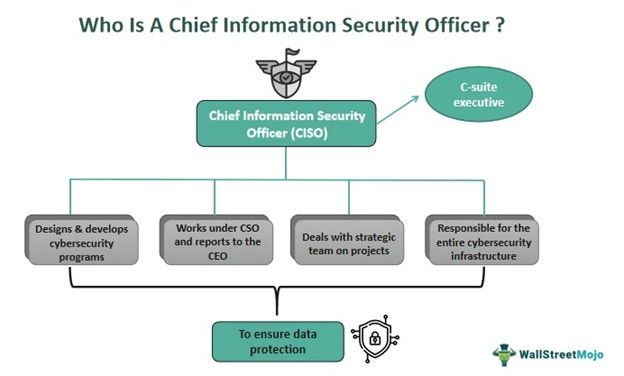Table of Contents
What Is A Chief Information Security Officer (CISO)?
A Chief Information Security Officer is a senior-level designation with the responsibility of designing and implementing security programs, carrying out functions, framing policies, and fulfilling the cyber security needs of an organization to ensure that its data remains protected from internal and external threats.

The designated person is also responsible for data recovery and procurement of cybersecurity products and services to ascertain that every valuable asset, file, report, document, system, and communication structure is well-maintained and thoroughly monitored. The person may work with the chief security officer (CSO), sometimes referred to by other titles.
Key Takeaways
- A Chief Information Security Officer is a senior executive in the IT department who designs systems, policies, and guidelines for cybersecurity and protection.
- Every organization with critical data and digital assets likes to have a CSO designated in their senior management to anticipate, inform, and mitigate such threats.
- The preferences and salary structure of a CISO are based on their education, experience, and skill in the entire information technology field.
- A CISO is responsible for designing, implementing, and encouraging people to promote and spread cybersecurity awareness.
Chief Information Security Officer Explained
A Chief Information Security Officer (CISO) is a significant job title for individuals with impeccable knowledge of data protection, cybersecurity programs, and infrastructure. Corporations and government agencies appoint them to focus on building systems and firewalls and anticipate any foreseeable internal or external threats to the entire enterprise's digital security.
The role of the Chief Information Security Officer is crucial in the IT department. These professionals enable programs to prevent security breaches and data theft associated with company assets and confidentiality. A CISO has a broad scope of duties related to risk management and mitigation while working in the corporation's best interest. Typically, a CISO reports directly to the CEO, discusses security blueprints and preventive measures, and identifies opportunities and loopholes.
The Chief Information Security Officer jobs centrally focus on the ability of an individual to detect, quantify, and be updated with information to guide security initiatives. They are entitled to establish governance practices and a risk-managed framework to build a secure ecosystem for businesses that also maintain a digital database prone to unauthentic access.
A CISO is often confused with a CSO, but both are different designations with distinguished duties. Generally, the former works under the latter and is also a part of operational teams and is not limited to providing guidance and strategizing.
Qualifications
The qualifications that recruiters look for while hiring a CISO are as follows -
- A bachelor's degree in computer science, criminology, and business and a clear IT perspective.
- Degrees like a Master of Science in Cybersecurity (MSCS) are preferred.
- Knowledge of computer languages and operating systems well.
- In many firms, an applicant can start from an entry-level position in the IT department and, with knowledge and experience, can move up the corporate ladder.
- Every company has its recruitment process, but typically, the more experience an individual has, the more chances they have of getting a job.
- There are many chief information security officer certification courses that one can enroll in to have a comprehensive ideology of all the duties and tasks of a CISO.
Roles and Responsibilities
The duties and responsibilities are -
- Every company has core objectives, and a CISO has to align them with cyber security and protection.
- They are not only there to guide the cybersecurity program strategically but also to check on its implementation with set regulations, legislation, and policies.
- CISO thrives on regulating clear communication and formatting the program for non-technical personnel.
- They constantly monitor and report the slightest information of possible and potential threats to senior executives and top management.
- They have the responsibility of data recovery and breach prevention in cybersecurity programs.
- The whole IT department is allocated a budget, and a CISO must make the best optimal utilization of its resources.
- A core responsibility of a CISO is to promote and encourage a culture and environment of robust information security.
- A CISO is essential in spreading awareness and providing cyber security training and assessment.
- Crisis management and designing responsive measures if any external or internal threat occurs.
- A Chief Information Security Officer helps eliminate supply chain management and develop good vendor relationships.
- Look after each level's total and complete cybersecurity system and plan for possible future security threats.
Salary
As of January 2023, the average salary of a CISO in the United States is $234,205. The fluctuation bracket is between $208,475 and $265,127. Many factors affect the salary one receives as a CISO. These include skills, knowledge, experience, certifications, and educational background.
A chief information security officer in India receives compensation ranging between ₹16.8 Lakhs to ₹100 Lakhs. The average annual compensation is considered to be ₹36 Lakhs. In India, experience plays a vital role in defining the salary for a CISO.
